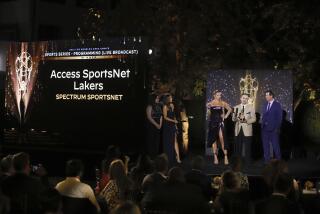Cable Firm to Add Mainline Religious Service, Trim TBN
- Share via
In a move that affects 100,000 cable television subscribers and comes at a critical juncture for two influential religious broadcast services, a south Orange County cable operator will add mainline religious programming at the expense of time allotted to the conservative, evangelical Trinity Broadcasting Network.
Dimension Cable’s decision to put both services on a single channel, effective April 4, is another blow to Tustin-based TBN, which has been losing spots on various cable systems nationwide. TBN now will be sharing a Dimension channel with the new Vision Interfaith Satellite Network, a multidenominational, ecumenical service.
Officials of both Dimension Cable and VISN agreed that the local channel-sharing arrangement would be a critical test of VISN’s viability as a service and whether it will be able to earn an audience equal to or better than KTBN Channel 40, the flagship station of TBN. TBN officials did not return telephone calls.
Called It Unpopular
The arrangement will take effect despite a survey of 450 subscribers in an affluent area including Laguna Beach, Mission Viejo, Dana Point, El Toro and San Juan Capistrano that indicated religious programming in general was unpopular, a Dimension official said. Dimension is a subsidiary of the Times Mirror Co., publisher of the Orange County Edition of The Times.
Although Dimension is actually expanding its channel capacity, according to Christopher Forgy, a senior vice president for programming and marketing, viewers asked their preferences for new channels stated clearly that they were least-interested in adding religious programming of any kind.
The same survey found that KTBN was the least-popular of all of Dimension’s existing basic services, with 70% of respondents saying they have never watched it. (KTBN, a UHF station, can be seen throughout Orange County without the assistance of cable.)
In other cities, TBN has sometimes waged advertising and letter-writing campaigns to stay on cable systems, and one TBN official once described VISN as “a network that is developed by liberal, non-Bible-believing denominations.”
In this case, however, TBN itself may have been the victim of an orchestrated campaign.
Forgy acknowledged that Dimension received more than 700 letters requesting that the system carry VISN. A spokesman for VISN in New York said that the service had contacted local churches and ecumenical councils around the country through its denominational representatives, mailing out kits describing VISN and urging members to contact cable services.
KTBN is one of 17 UHF stations controlled by Trinity, which produces a 24-hour Christian programming service that also appears on the network’s 80 low-power stations and several dozen affiliated stations, as well as 580 cable systems, according to its sales brochure.
Phillip Crouch, brother of TBN founder and president Paul F. Crouch, recently told Cable Television Business magazine that Trinity was less concerned with gaining cable viewers than with building the low-power stations--smaller stations that reach a limited area but those that can be received without cable or any other special equipment.
Nevertheless, the new arrangement was welcomed by a VISN official.
Glad to Be in County
“We think it’s significant that this programming is going to be carried in Orange County,” said William W. Airey, VISN’s director of affiliate relations. “This area has been dominated by a relatively narrow type of religious programming that appeals to a comparatively small group of viewers.”
Both Airey and Dimension’s Forgy agreed that the arrangement also would be a test of whether either VISN or TBN or both will remain on the Orange County system and whether VISN will be carried on any of Dimension’s other systems. Irvine-based Dimension has a million subscribers nationwide, Forgy said.
VISN’S main financial backer has been Tele-Communications Inc. of Denver, the nation’s largest cable operator. Because it does not sell time to televangelists or permit solicitation of funds by broadcasters, it has attracted the support of other large system operators.
“With the scandals of religious broadcasters in the last several years, principally (Jim and Tammy Bakker’s Praise the Lord Club), there was almost a groundswell of opinion in the cable industry” for a service like VISN, said Gregory J. Liptak, president of Jones Intercable Inc., another industry giant also headquartered in Denver.
Dropped TBN for Z Channel
Last spring, Rogers Cable, one of the largest operators in the nation and which serves 73,000 subscribers in Garden Grove, Huntington Beach, Fountain Valley, Westminster, Stanton, Cypress and Los Alamitos, dropped Trinity to make room for the Z Channel after a viewer survey suggested that the TBN outlet was the least-watched station on the system. The move was carried out without controversy, said Mike Schenker, Rogers’ executive vice president.
In San Diego, Cox Cable, which serves 300,000 subscribers, dropped a Christian cable service that included TBN programming for another religious service, a development that Crouch has mentioned several times on the air. Daniels Cable, which serves 42,000 customers in northern San Diego County, will begin running 5 hours of VISN April 1 but will leave KTBN in place for now, according to Phil Urbino, the system’s director of community relations.
In 1988, when Jones Intercable decided to gradually replace TBN programming with VISN in Albuquerque, N.M., Jack Hightower, head of TBN Cable Sales, tried to rally support among area residents who were receiving Trinity’s newsletter.
Supporters were urged to call or write Jones Intercable in protest, and thousands did, but the reduction remained and TBN issued an apology. Hightower, who is based in Denver, declined to answer any questions about the incident.
In Greensboro, N.C., when Cablevison dropped two Christian stations--including one owned by Trinity--from the system, TBN took out newspaper ads, asking supporters to write or call the cable company, which they did without success.
‘Cordial’ Talks With Crouch
Dimension’s decision to cut back on KTBN’s hours followed “cordial, professional” talks with Paul Crouch, Forgy said.
“Early on they were predictably excited” when they learned of the cutback, Forgy said. Later, they requested that their 12 hours include evening prime time, voicing particular concern about “Praise the Lord,” TBN’s live, prime-time talk show host by Paul Crouch and his wife, Jan.
Dimension agreed, Forgy said, adding: “I don’t really expect a concerted effort on their part to protest the shift, given these discussions.”
Aside from programming differences, there is a financial difference between the two systems. Cable system operators are paid up to 25 cents per subscriber per year to carry KTBN. VISN, on the other hand, charges cable system operators 36 cents per subscriber to carry the service.
In addition to “Praise the Lord,” TBN features paid broadcasts by such other televangelists as Robert H. Schuller of Garden Grove’s Crystal Cathedral, Jimmy Swaggart, James Robison, Kenneth Copeland and Richard Roberts, son of Oral Roberts. Show business hosts include Art Linkletter, Dale Evans, Gavin Macleod, Efrem Zimbalist Jr. and Meadowlark Lemon, with frequent guest appearances by Pat Boone and Jane Russell. The format is dominated by talk shows, but there are also children’s and exercise programs, soap operas and game shows, and even a late-night, Christian version of MTV, called “Reel Videos,” hosted by Crouch’s son, Matt, and daughter-in-law, Laurie.
Assemblies of God
With the exception of Schuller, who is a member of the mainline Reformed Church in America, one Catholic priest and several fundamentalist Baptists, most broadcasters on TBN come from the Assemblies of God, the conservative denomination in which Crouch and his brother, Phillip, the network’s vice president, were ordained.
While Trinity does sell some of its broadcast time to televangelists who ask for money, it does not carry product commercials and raises most of its income from twice-yearly fund-raising drives.
VISN’s 15 hours of programming per day includes a weekday morning worship service that rotates between religious groups. On Sundays, services include two Catholic Masses and the service from the Marble Collegiate Church in New York. Other shows feature music, documentaries, magazine formats, cartoons, dramas and soap operas, and family films followed by discussions. On “One in the Spirit,” Protestant groups bring to viewers “the stories of Christians who have made a difference both in this country and around the world.” Another series, called “Old Friends, New Friends,” is hosted by Fred Rogers of “Mr. Rogers’ Neighborhood.”
The 20 “faith groups” which appear on VISN represent Baptists, Roman Catholics, Methodists, Presbyterians, Jews, Greek Orthodox, Lutherans, Mormons, Episcopalians, Mennonites, the Salvation Army and Seventh-day Adventists. None of those appearing on the network are permitted to attack other denominations, Airey said.
VISN sells time to established religious organizations at $250 per half-hour, making certain that no group dominates the schedule or prime time. Advertising is sold in some time periods. However, these commercials must meet strict standards and are limited to 4 minutes per half-hour, compared to 6 minutes on most cable systems and 8 minutes on commercial television.
More to Read
The biggest entertainment stories
Get our big stories about Hollywood, film, television, music, arts, culture and more right in your inbox as soon as they publish.
You may occasionally receive promotional content from the Los Angeles Times.










